Savannah F1 & F2
Introduction
The Savannah is an extraordinary cat breed that has won the hearts of many cat enthusiasts with its exotic appearance and lively personality. These cats are known to be one of the largest in the feline world. They are the result of crossing an African serval with a domestic cat. Their name is inspired by the natural habitat of the serval, the African savannahs. High-generation Savannahs, especially F1 and F2, are the closest to their wild ancestors in terms of size and behavior, which makes them both fascinating and demanding as pets. We have chosen to work exclusively with high-generation Savannahs in our breeding program: F1 and F2. The Savannah F1 is a cross between a domestic cat and a serval, while the Savannah F2 is a cross between a Savannah F1 and a Savannah F5.
Table of Contents
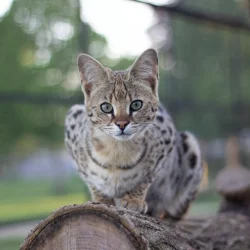
The origins of the Savannah breed
The Savannah breed was officially created in the 1980s by American breeder Judee Frank. The first Savannah, a female named "Savannah," was born in 1986 from a cross between a male serval and a domestic Siamese cat.
The breed quickly gained popularity due to its exotic appearance and unique personality, and it was officially recognized by The International Cat Association (TICA) in 2001.
The F1 and F2 generations are the closest to the serval ancestor, with F1 being direct descendants of a serval and F2 being the grandchildren. Today, Savannahs F1, F2, and F3 cannot be registered with LOOF (the French Cat Registry), but they can have a TICA pedigree.
Currently, Savannah F1 and F2 remains a very rare breed and difficult to reproduce. There are very few breeders in France and even worldwide.
Classification of Savannahs from F1 to F7
Classification of Savannahs from F1 to F7: The Savannah is a hybrid cat, meaning it is a crossbreed between a domestic cat and a serval. The serval is a feline native to Africa. It is easily recognizable by its physical features: long legs, long rounded ears held high on the head, and dark rosette spots on a golden base coat. Therefore, a classification system is used, and generations are referred to as F1 to F7. F1hp, also known as the first generation with a very high percentage of wild blood, is obtained from crossing an F1 Savannah with a serval, resulting in approximately 75% serval blood.
F1: Also known as the first generation, it is the result of crossing a domestic cat with a serval, resulting in a serval blood percentage of over 50%.
F2: The second-generation Savannah is a cross between a first-generation Savannah and a fifth or sixth-generation Savannah. Since male Savannahs from the F1 to F4 generations are often infertile, a male F5 is used for breeding. This is what makes Savannah reproduction complicated, as the male is often smaller than high-generation females. Therefore, one of the grandparents is a serval, resulting in a serval blood percentage typically ranging from 25 to 50%.
F3: The third-generation Savannah is a cross between a second-generation female Savannah and a male Savannah that is at least a fifth-generation.
One of the great-grandparents is a serval.
F4: The fourth-generation Savannah is a cross between a third-generation female Savannah and a male Savannah of at least the fifth generation.
To determine the generation of your future kitten, take the lowest generation and add 1. For example, crossing an F1 Savannah with an F5 male will result in kittens of the F2 generation (F1 + 1 = F2).
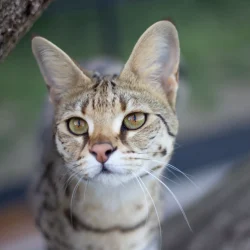
Physical characteristics of Savannah F1 and F2
Savannah F1 and F2 cats are known for their impressive size, spotted coat, and elegant appearance. They are the largest Savannahs you will find because they are directly descended from the African serval.
Their size can vary, but many Savannah F1 and F2 cats are as large, if not larger, than some small dogs.
They have a long and slender body with a sturdy bone structure and well-developed musculature.
Their coat is typically golden to silver in color, adorned with black or dark spots called rosettes, which is a heritage from their serval ancestor. These cats also have large upright ears, green to golden-colored eyes, and a short tail. Their overall appearance combines the domestic cat's look with the wild and exotic features of the serval.
The Savannah is a stunning and sleek cat that doesn't resemble any other domestic cat.
Personality and behavior of Savannah F1 and F2
Savannah F1 and F2 cats are known for their lively and adventurous personalities. They are highly active, curious, and enjoy exploring their environment.
If you want your Savannah to be happy and fulfilled, it's important to provide them with a stimulating environment. These cats are also known for their intelligence and ability to learn quickly. They can be trained to perform various tricks, such as fetching a toy or walking on a leash. This intelligence allows them, for example, to be capable of opening doors to go where they want. Despite their independent nature, Savannah F1 and F2 cats are also very affectionate and enjoy spending time with their human family. They appreciate human contact and presence but also know how to disappear for a nap in a quiet and secluded place.
However, their wild nature means they need a lot of space to exercise and may not be suitable for apartment living if the space is too small or poorly arranged. The Savannah is also a cat that loves water, so they will always be delighted to play with bathwater or their water bowl.
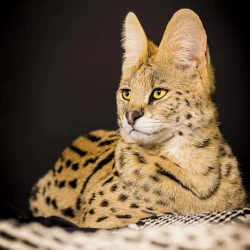
Specific care and needs of Savannah F1 and F2
Due to their wild heritage, Savannah F1 and F2 cats have specific care needs. Investing in their well-being will come with certain costs. Firstly, high-generation Savannahs require a protein-rich diet to support their high activity levels. Savannah F1 and F2 cats should be fed a BARF (Biologically Appropriate Raw Food) diet, mainly consisting of chicken and chicks. Dry kibble can be offered as occasional treats rather than the main part of their diet. Poor nutrition can lead to growth issues and weakness in their joints.
We recommend ordering BARF (Biologically Appropriate Raw Food) for your Savannah from the Saint Laurent website, which offers BARF and chicks at a very reasonable price. I have included the website below: Aliments congelés, viande congelée – St Laurent (st-laurent.fr)
It will be necessary to provide your Savannah with a stimulating environment with plenty of opportunities to play and explore. It is best to give them access to an outdoor aviary to allow them to play and vent their energy safely. Their short coat is very easy to maintain, although regular brushing is recommended to remove dead hair.
Due to their curious and active nature, it is important to secure your home to prevent them from putting themselves in danger by climbing high furniture or escaping outside.
Training and socialization of Savannah F1 and F2
Training and socialization of Savannah F1 and F2: Savannah F1 and F2 cats are intelligent and curious animals that can be trained to follow certain rules and routines. Toilet training is usually straightforward, and these cats can even be trained to use human toilets or walk on a leash. Many families take their Savannahs for walks in the forest or through fields.
However, it is important to note that their behavior remains close to that of a wild animal, and they require early and ongoing socialization to become accustomed to different people, animals, and situations they may encounter in their environment. It is crucial to choose a sociable and well-adjusted Savannah to make it a perfect family cat. Otherwise, it will be very challenging for them to adapt to family life.
Due to their active and curious nature, they will also benefit from environmental enrichment, such as cat trees, interactive toys, and walkways. Providing them with access to a secure outdoor environment will be a significant advantage. Please note that this outdoor environment must always be secure and meet strict standards. A high-generation Savannah that manages to escape could venture far away and never return, driven by its instincts and curiosity.
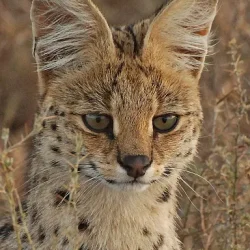
Health and longevity of Savannah F1 and F2
Health and longevity of Savannah F1 and F2: Savannah F1 and F2 cats are generally robust and in good health. Like all cat breeds, they may be predisposed to certain genetic conditions, so it is important to choose a responsible breeder who tests their breeding cats for common diseases. In most cases, Savannah cats should be tested for:
- PKdef: Pyruvate Kinase Deficiency, which is a deficiency in the enzyme key to red blood cell energy production. The consequence of this deficiency is anemia. Symptoms include fatigue, loss of appetite, and pale mucous membranes.
- APR rdac: Autosomal Progressive Retinal Atrophy, which is a genetic disease that causes progressive degeneration of the retina's rods and cones. It leads to complete blindness in adult cats between 3 and 5 years of age.
With proper care, a balanced diet, and regular exercise, Savannah F1 and F2 cats can live up to 15 years or more. However, as they are very active, they may be more prone to physical injuries and should be monitored to prevent accidents. Regular veterinary check-ups are also recommended to ensure their long-term health. A high-quality diet will help your Savannah stay in shape and avoid deficiencies and health problems later on.
Adopting a Savannah F1 or F2: what you need to know
Adopting a Savannah F1 or F2 is a significant responsibility. These cats have specific needs due to their size, activity level, and close resemblance to wild animals. Before adopting, it is important to ensure that you are ready to dedicate time, energy, and resources to their care.
Please note that it is now mandatory to have a non-domestic feline license (capacitaire félin non domestique) to own a Savannah F1. We can put you in touch with professionals to obtain this license. When choosing a breeder, make sure they are responsible and care about the well-being of their cats. A good breeder will be able to provide you with information about the parents' health, the kitten's medical history, and advice on caring for Savannah F1 and F2 in terms of training, health, and diet.
All our Savannah kittens come with:
Identifié par puce électronique
- Vaccinations
- Health record
- Internal and external parasite treatment
- Certificate of good health
- TICA (The International Cat Association) registration
- Spayed/neutered for pet homes
- Reservation contract, sales contract, and invoice
- 3-month health insurance with Santévet
- Commitment and knowledge certificate
- Kitten starter kit
- Folder with parents' test results and TICA registration
To reserve a kitten, we require a deposit of 30% of the kitten's price. The prices for pet homes are as follows:
Male and female F1: 10,000€
Male and female F2: 8,000€
Male and female F3: 5,000€ to 6,000€
Pour toute demande de chaton pour reproduction merci de prendre contact avec nous afin de nous présenter votre projet. Nous ne vendrons pour reproduction qu’a des professionnels disposant d’un numéro de SIREN et ACACED et de la formation féline non domestique
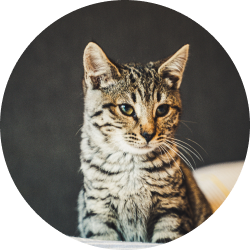

Waiting list
When we receive confirmation of pregnancy from one of our females, you can join a waiting list, which ensures that you can choose your kitten with priority based on physical and temperamental characteristics.
We offer a unique journey and experience that allows you to participate in the development of your future kitten. You will receive weekly updates from its birth until the time it can join you, typically around 11 to 12 weeks of age.
We do not offer farm visits as we need to focus on our breeding operations and are unable to meet the increasing demand for farm visits.
FAQ
Do Savannah Cats need special care?
Savannah cats are generally considered to be a healthy breed, but as with any animal, they do require proper care and attention to maintain their health. It is important to provide them with a well-balanced diet, regular veterinary check-ups, and to keep them up to date on vaccinations and parasite prevention. Some Savannah cats may develop hip dysplasia due to their large size and growth rate.
Do Savannah Cats get along well with kids and other pets?
Savannah cats make good family pets if raised and socialized with children and other pets from a young age. They can get along well with children and other pets. However, they are quite active and energetic, so they may not be suitable for families with very young children who can’t keep up with their energy levels.
It is important to note that Savannah cats are a relatively new breed and possess a strong prey drive. Therefore, it is necessary to supervise them around smaller children and animals. They also require a lot of attention, playtime, and exercise. If you are considering getting a Savannah cat, be prepared to provide them with the time, attention, and space they need to be happy and healthy.
Are Savannah Cats hypoallergenic?
Savannah cats are not hypoallergenic.
There is no such thing as a completely hypoallergenic cat as all cats produce some level of allergens. Some people may be less allergic to certain breeds than others, but ultimately, the best way to find out if you are allergic to a cat is to spend time with one. If you’re considering a Savannah cat and you have allergies, it’s a good idea to spend some time around them to see if they trigger your allergies.